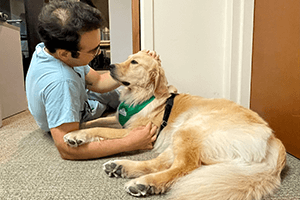Pups for Peace
February 27, 2024
Therapy dogs bring tranquility not only to patients, but caregivers, too
When a young patient hasn't spoken or eaten in days, a cancer patient craves comfort or a caregiver working long hours needs a break from a stressful day, the presence of UH's furry PetPals provide relief like no other.
Ramtin Dastgir, DDS, an oral and maxillofacial surgery research fellow working long hours, finds immense peace in the trust and love he feels from the golden retriever Loki. With every stroke of Loki's shiny golden fur, he says he can feel his anxiety levels plummeting. The exchange of trust brings a sense of serenity.
 Ramtin Dastgir, DDS and PetPals Loki.
Ramtin Dastgir, DDS and PetPals Loki.“Experiencing personal sessions with Loki was a transformative experience that gifted me with an incredible sense of tranquility," said Dr. Dastgir, who moved to Cleveland from Iran last summer for his fellowship. "The gentle nature and unconditional love of this special pup created a comforting environment that was immensely soothing. It was as if all my worries and hardships were momentarily suspended, replaced by the warmth of this beautiful creature's presence and his gentle touch.
“His calm demeanor was a gentle reminder that sometimes, it's the uncomplicated moments in life that bring the most peace."
Three-decade Legacy of Delivering Unconditional Love
UH has one of the oldest pet therapy programs in the country. PetPals are specially trained dogs brought in by volunteers at UH locations across the system. For more than 30 years, UH has been arranging visits from these animals – mostly dogs, but even a cat and a horse – for patients and caregivers alike. Across the UH system, there are 130 registered Pet Pals, which include facility dogs who work side by side with UH employees, and therapy dogs brought in by volunteers. All are specifically trained to bring love and comfort to those they visit.
“The need across the system is overwhelming," says Diane Pekarek, CAIS, C-AAIS, Marion C. Risman & Family Endowed Pet Pals Coordinator, a canine-assisted intervention specialist who studied canine cognition behavior at the University of Denver's Graduate Institute for Human-Animal Connection.
The program was paused early in the COVID-19 pandemic due to visitor restrictions, and some dogs did not return. But the demand for visits has tripled since the height of the pandemic, with requests pouring in from both patients and caregivers.
“They don't judge, they just walk in all happy, and the dog feels who needs him the most," says Diane, who fields 30 to 40 requests per day at UH Cleveland Medical Center alone. “They just love on them."
Diane is actively recruiting dogs for hospitals throughout the system, from UH Lake West in the East Market to UH Samaritan in Ashland County to UH Parma in the West Market. She also needs more PetPals to visit patients at UH Seidman Cancer Center and UH Rainbow Babies & Children's Hospital.
All Breeds Welcome, Friendly Disposition Required
Clearing up a common misconception that PetPals need to be pure-bred and receive expensive training, Diane explains that it's not so complicated. Many types of dogs, even mixed breeds, can be certified locally by a number of different organizations. She has Mastiffs, pit bulls and Doberman Pinschers on her roster.
Diane then works with each dog to orient the pet to the sights, sounds and smells of the hospital environment. They are allowed to jump on the beds of patients if invited, Diane says.
Some friendly dogs don't adapt to the hospital setting, but many find their calling as therapy dogs.
“As long as the dog has the desire to be interacted with – they don't just tolerate it – they'll love working at UH," Diane said.
In recent years, UH has invested in four facility dogs, who spend their 40 hours a week at the hospital and go home in the evening with employees who double as their handlers. The dogs' expenses, from food to veterinarian bills, are covered by PetPals.
-
To receive a PetPals visit at main campus, call the Woof Line at 216-844-WOOF (9663).
-
For specific questions about the UH PetPals program, email PetPals coordinator Diane Pekarek.
Tags:


